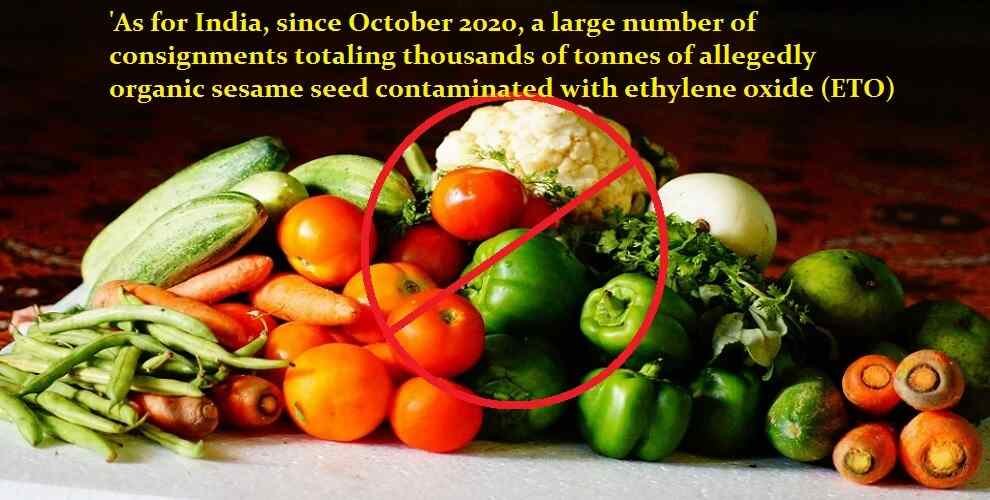The European Commission is planning to bar five certifying agencies from certifying organic product exports from India after Indian shippers cleared by them failed to meet ethylene oxide presence standards in their export consignments, particularly sesame (Sesamum indicum), also known as benne, erect annual plant (til/gingelly).
In recent months, the European Union issued at least 90 notifications in the Organic Farming Information System (OFIC), prompting the withdrawal of their recognition to certify organic products from India. The decision was taken in a meeting of the European Commission’s committee on organic production held in early July.
Also Read: APEDA signed MOU with IIMR to promote commercial cultivation, exports of millets
Exports are unlikely to suffer
According to the EC’s draft report released last week, four of these certifying agencies are based in Europe and one in the United States. According to S Chandrasekaran, a trade analyst based in Delhi, the development is unlikely to have an impact on India’s organic product exports because the country has 28 other agencies, both domestic and foreign, that can certify organic product exports.
According to him, the draft, which represents the EC’s preliminary views, will take effect automatically in the first week of November and will be valid until December 2026. The announcement follows reports that the EU found high levels of ETO residue in Indian spice shipments.
‘As for India, since October 2020, a huge number of consignments worth a total thousands of tonnes of allegedly organic sesame seeds contaminated with ethylene oxide (ETO) have been imported from that third country, especially from operators controlled by control bodies controlled and managed by India,’ the European Commission (EC) draft, says.
‘Dangerous to one’s health’
The European Union considers ETO to be carcinogenic to humans and has been closely monitoring imports to ensure that the maximum allowable level of ETO residue is not exceeded. According to the EC, the highest amount of the chemical permitted in Indian sesame shipments was far surpassed.
According to the proposal, the increased presence of ETO has resulted in ‘consumers being misled and a significant health risk,’ and the EC’s hands have been forced due to a ‘lack of response on the root causes of the control system failure from the control bodies involved in those contaminations.’
The document specifically stated that certifying agencies should not be included in the list of control bodies recognised by India’s competent authority – the Bureau of Indian Standards (APEDA).
The five agencies:
- CU Inspections India Pvt Ltd,
- Ecocert India Pvt Ltd,
- Indian Organic Certification Agency (Indocert),
- Lacon Quality Certifications Pvt Ltd – all, and
- OneCert International Private Limited.
‘APEDA strictly monitors’
The proposed EU legislation, according to APEDA Chairman M Angamuthu, is in response to a large amount of ETO detections in Indian organic consignments, mainly sesame. ‘Because the majority of the shipments were shipped under these five certifying bodies, the EU suggested removing them from the recognition list,’ he explained, adding that APEDA is closely monitoring the situation and taking action against erring bodies because it involves ‘the reputation of Indian companies.’
According to import and export trade analysts, these agencies taken into account for 90% of Indian organic product exports, but the decision to decertify them will benefit others and may result in the founding of a credible domestic certifying agency.
These certifying agencies had taken ‘improper corrective measures,’ jeopardising the robustness of the controls as well as the supervision itself.
Furthermore, based on the information obtained by the Commission, it appears that some of the control bodies involved in those OFIS cases did not respect India’s scope of recognition in terms of products that may be imported into the Union,’ according to the document.
According to trade analysts, India can only do so much because it is a third party in terms of sanitary, phytosanitary, and technical trade barriers. ‘Perhaps this is part of the EU’s strategy for negotiating free trade agreements,’ speculated Chandrasekaran.
Also Read: 27 pesticides are being considered for the ban, expert committee to look into it
However, the document includes provisions for CU Inspections to be recognised as a body certifying unprocessed food exports from Bangladesh and Ecocert to certify unprocessed and processed food exports from Nepal.
‘These provisions allow the agencies to establish an arm in India and continue operations despite India’s de-recognition,’ explained Chandrasekharan.


















Add Comment